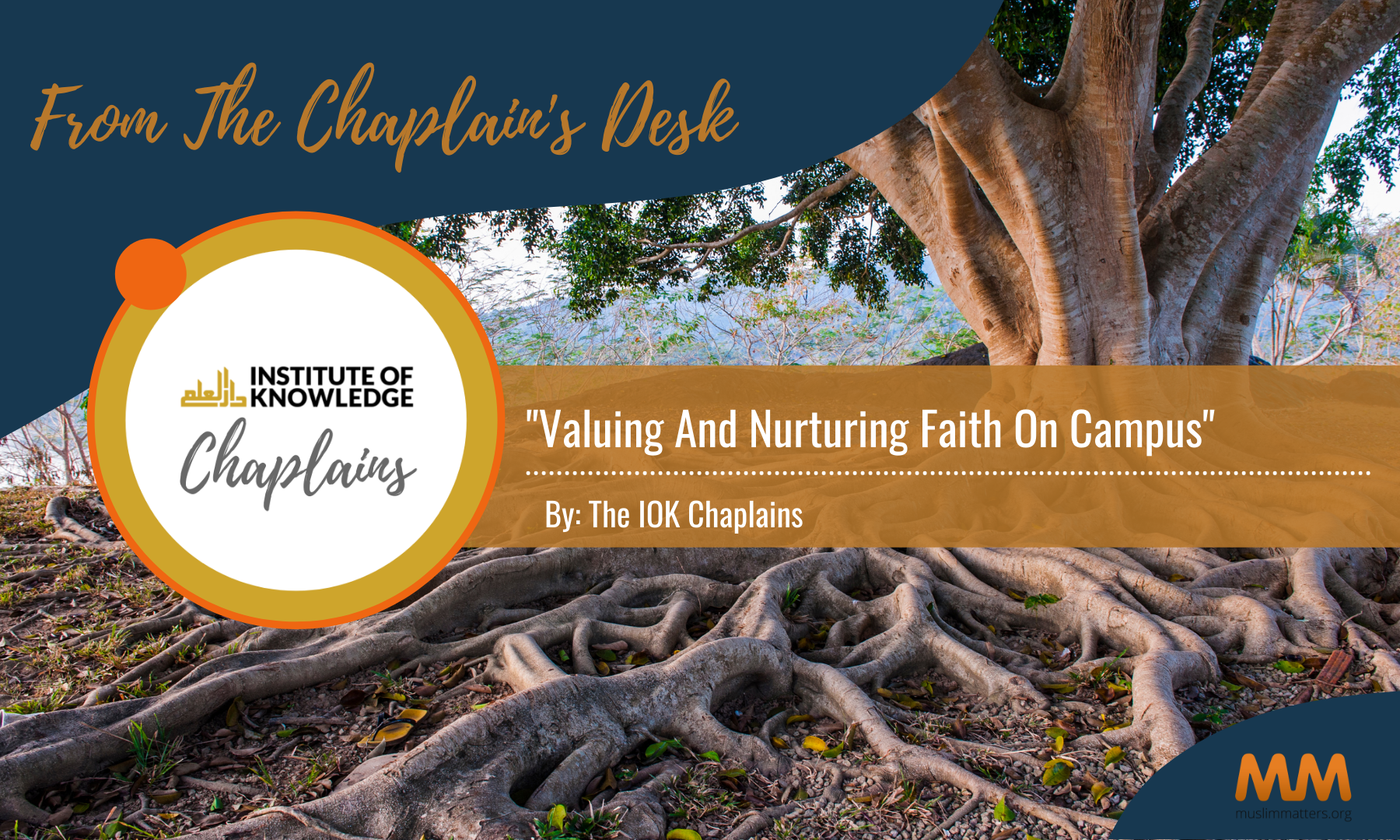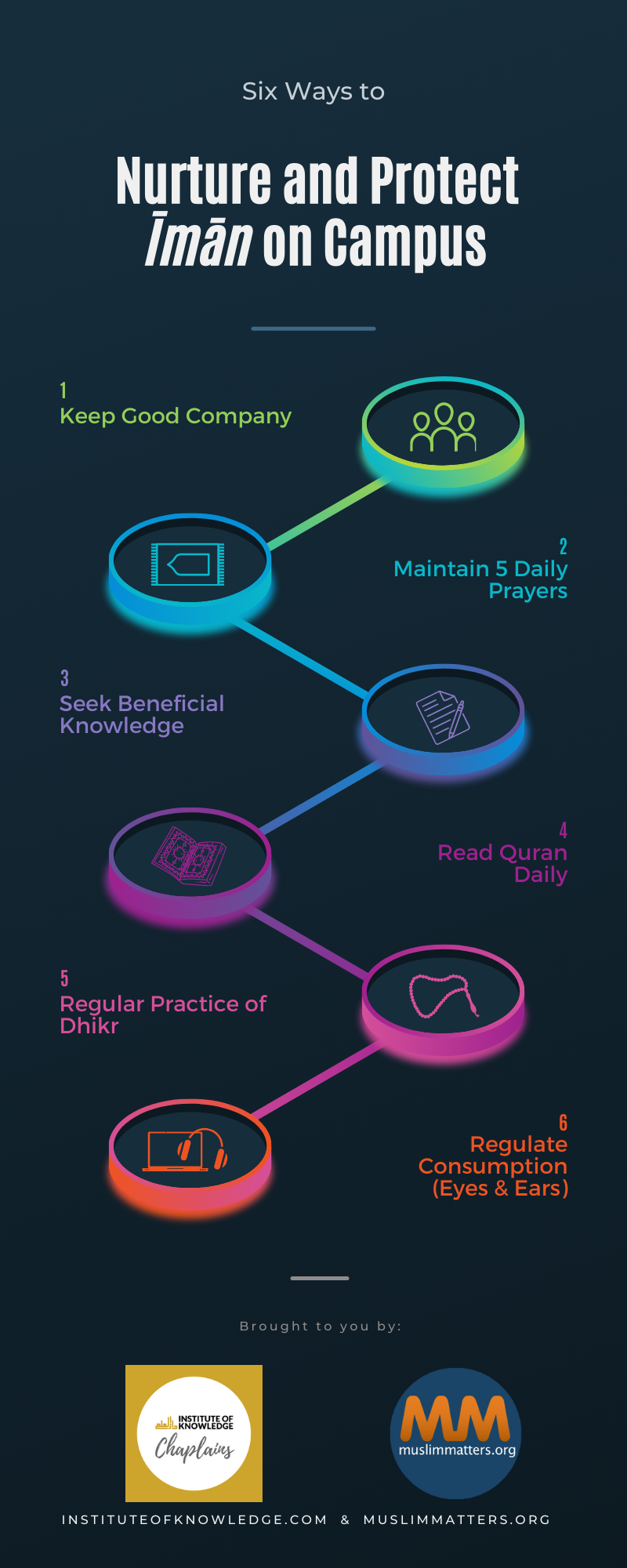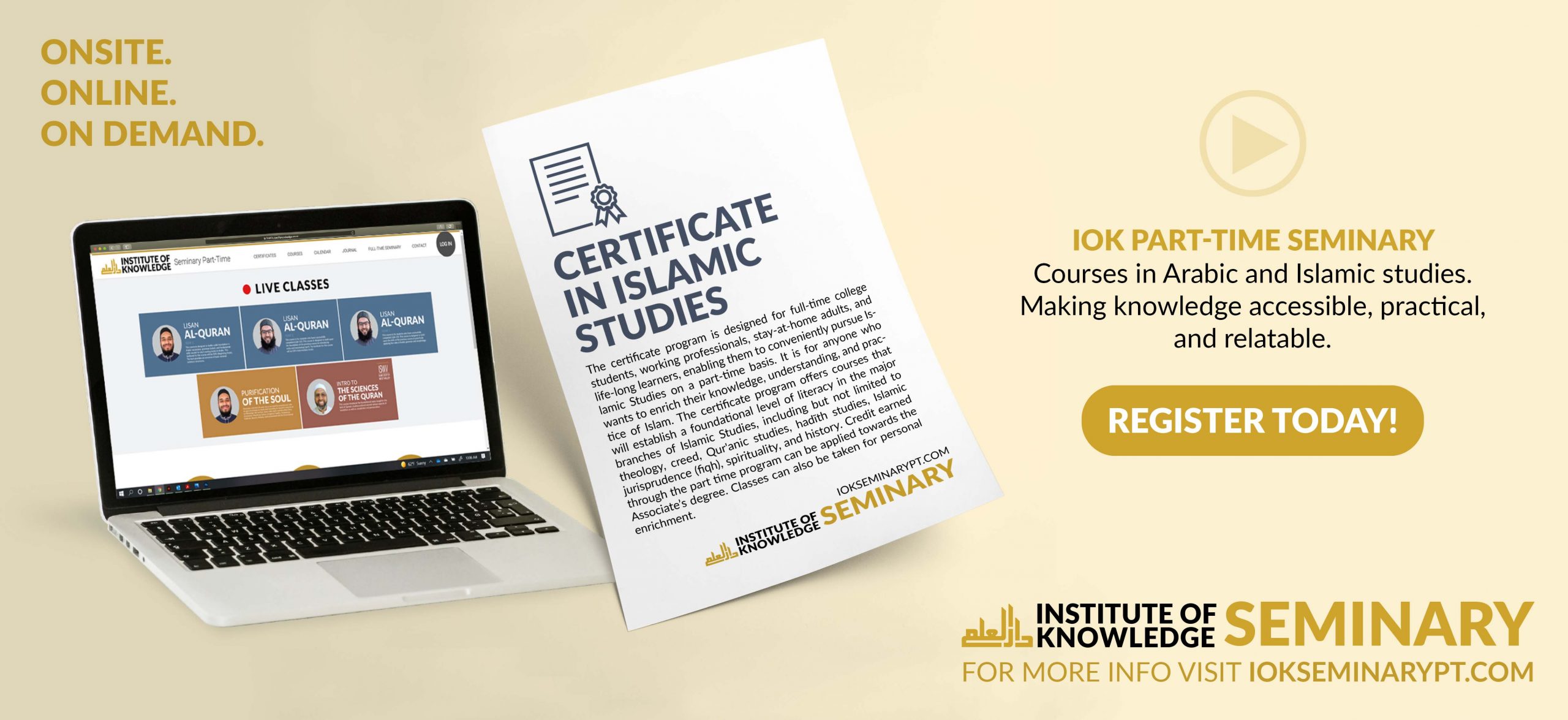#Society
From The Chaplain’s Desk: Valuing And Nurturing Faith On Campus

Published

Oftentimes, a student’s college/university career is one of the most defining stages in their life. It is the first time that they gain a level of independence; they move out of their parent’s home to a dorm or live with roommates off-campus and are responsible for now figuring certain things out on their own. During this time, a person is still forming, developing, and defining who they are as a person. They are still figuring out their beliefs, morals, values, ethics, principles, and worldview. From my personal experience working with college students, this is a time when a lot of individuals either lose their faith or find it.
The Gift of Faith





The Prophet 
Keep supporting MuslimMatters for the sake of Allah
Alhamdulillah, we're at over 850 supporters. Help us get to 900 supporters this month. All it takes is a small gift from a reader like you to keep us going, for just $2 / month.
The Prophet (SAW) has taught us the best of deeds are those that done consistently, even if they are small. Click here to support MuslimMatters with a monthly donation of $2 per month. Set it and collect blessings from Allah (swt) for the khayr you're supporting without thinking about it.
Through this infinite divine mercy, Allah 


The amount of blessings we have in our lives are innumerable; they can’t be counted or quantified, let alone even imagined.
“And He gave you from all you asked of Him. If you try to count the blessings of Allah, you would not be able to do so. Indeed, mankind is [generally] most unjust and ungrateful.” [Surah Ibrahim:34].
Just take the human body as an example; our eyes and ability to see, our ears and our ability to hear, our hands and the ability to touch and feel, the tongue and the ability to taste. In every single limb, bone, muscle, vein, and cell are countless blessings of Allah 
Out of all of these amazing and unimaginable blessings that we are constantly enjoying, the single greatest blessing that any of us has been given is that of īmān, or faith. It is invaluable and priceless; it is the most precious thing we possess. A lot of us may not recognize or realize the real value of this gift; we take it for granted. One of the reasons why many of us take it for granted is because it’s something that we didn’t have to struggle for. There was no time, energy, money, or sacrifice required for our faith. We were born with it. Ask those who had to struggle and sacrifice in order to be Muslim; those who searched for the truth and went through difficulties in becoming and being a Muslim. Their perception, understanding, and appreciation for īmān is very different from those who were simply born as Muslims.
What is Faith?
In order for us to appreciate something, to recognize its value, we have to understand what it truly is. What exactly is īmān? Īmān isn’t a simple concept; it’s multi-faceted. It has several aspects to it. The first and most important is this firm belief in our hearts in the existence and oneness of Allah 

We then express this belief in our hearts with our tongues by declaring and testifying, “We bear witness that there’s nothing worthy of worship except Allah and that Muhammad is His servant and Messenger.”
This faith then expresses itself through our speech and behavior. Meaning, our speech and behavior, or the way we carry ourselves and the way we interact with others, should be reflective of this faith and belief. Everything we do should be an expression of our īmān. It is supposed to play a role in every single aspect of our lives.
In the Quran and ḥadīth, īmān is compared to a tree, specifically a date palm. Allah 
“[Prophet], do you not see how God makes comparisons? A good word is like a good tree whose root is firm and whose branches are high in the sky, yielding constant fruit by its Lord’s leave- God makes such comparisons for people so that they may reflect.” [Surah Ibrahim:24-25]




Īmān is how we worship Allah 

Cyclical Nature of Faith
Faith is not some abstract concept, some intangible that can’t be touched; it’s not some emotion. Rather, our faith is something that is living and organic; it can be felt and seen. Part of that experience is that we feel our faith going through cycles; sometimes it’s very strong and at other times it feels very weak. Īmān goes up and down and it’s natural to feel this. This is a feeling that was experienced by the Companions as well.
Ḥanẓalah
narrates, “Once we were with the Prophet ﷺ when he delivered a sermon. Our hearts became tender, our eyes were flowing with tears, and we realized where we stood. I left the Prophet and returned home. I sat with my wife and children and cracked jokes with my wife and I felt the effect of the Prophet’s sermon had completely vanished from my heart. At that moment it occurred to me that I wasn’t what I had been and I said to myself, “O Ḥanẓalah! You’re a hypocrite.”
I was overcome with sorrow and sadness so I left my house repeating these words, “Ḥanẓalah has become a hypocrite.” On my way I met Abū Bakr
so I said to him, “Ḥanẓalah has become a hypocrite.” He said, “Glory be to Allah! What are you saying? Ḥanẓalah can never be a hypocrite.”
So I explained to him that whenever I’m with the Prophet ﷺ and listen to him speak about heaven and hell, I feel as if both are present before my own eyes. When I go home and become occupied with my family I completely forget about the hereafter.
After hearing this Abū Bakr
said, “I feel the exact same thing.” So they both went to the Prophet ﷺ. Ḥanẓalah
said, “O Messenger of Allah! Ḥanẓalah has become a hypocrite.” The Messenger of Allah ﷺ asked, “Why is that?” He said, “O Messenger of Allah! When we are with you and you talk to us about Paradise and Hell, it is as though we can see them right before our eyes. But when we leave you and we become occupied with our wives, children, and livelihoods we forget much.” The Prophet ﷺ consoled them and said, “By Him who controls my life! If you could keep that state that you have when you are with me, the Angels would greet you when you walk and when you go to bed. But, O Ḥanẓalah! There is a time (for worship) and there is a time for worldly engagements).” He ﷺ said this three times [ Muslim, k. al-tawbah, b. faḍl dawām al-dhikr wa al-fikr fī umūr al-ākhirah…, 2750].
This is a very instructive incident from the life of the Prophet ﷺ highlighting several beneficial points of guidance, lessons, morals, and reminders. I want to focus on the fact that the Companions of the Prophet 
Nurturing and Protecting our Faith on Campus

1. Keep Good Company
Whether we recognize it or not, our environment has a very powerful impact upon our lives. It affects our mindset, attitude, speech, behavior, character, and beliefs. The Prophet ﷺ said, “A person is upon the way of life of their close friend, so be careful who you choose as a close friend.” [Tirmidhī, k. al-zuhd, 2378]. Join the MSA/MSU on campus and surround yourself with individuals who share the same beliefs, morals, ethics, values, and principles.
2. Maintain Your Five Daily Prayers
The importance and significance of prayer and its relation to our faith cannot be overemphasized. It is the most important act of worship that we are required to do. No matter what happens, make sure to pray your five daily prayers on time regularly and consistently. Ideally, perform them in congregation with other students on campus. Prayer is a light that guides us to the path of success. It illuminates hearts and minds, lighting the path to guidance and righteousness. It has a profound spiritual effect upon us.
3. Seek Beneficial Knowledge
There are several verses of the Quran and aḥādīth that describe the virtues, rewards, and blessings associated with seeking knowledge. These verses and narrations are designed to create a sense of zeal, motivation, and enthusiasm for spending time, energy, and effort in the pursuit of knowledge. Find a local class or study circle and attend it regularly. Spend some time weekly learning about Allah ﷻ. The best way to nurture a deep love for Allah ﷻ is by learning about Him through His Divine Names and Attributes.
4. Read Quran Daily
The Quran is a book of guidance. It contains guidance for every single aspect of human life. It contains a detailed explanation of what humanity needs in terms of guidance, success both in this life and the next and salvation. Allah ﷻ says, “This revelation is no fabrication: it is a confirmation of the truth of what was sent before it; an explanation of everything; a guide and a blessing for those who believe.” [Surah Yusuf:111]. It should be treated as a personal guidebook: a roadmap towards faith, practice, morality, ethics, God-consciousness, obedience, worship, paradise, and essentially the Divine. One should take the time to read, reflect and ponder over the meanings of the verses and then internalize their message through practice. “We have made it easy to learn lessons from the Quran: will anyone take heed?”
5. Have a Regular Practice of Dhikr
Dhikr is considered to be the nourishment of hearts, the connection between a person and their Lord. It is something that brings them closer to Allah ﷻ. Just like the physical body requires nutrition to remain healthy and alive, so too does the soul. The nourishment of the soul is the remembrance of Allah ﷻ.
6. Regulate What You Consume with Your Eyes and Ears
The eyes and ears are two inroads to the heart that can have a profound impact upon its spiritual health. We should be very careful and cautious about what we consume; what we let into our eyes and ears. Our consumption of TV, movies, and music should be very controlled. Our internet usage and the amount of time we spend online should also be regulated. You can do this by sitting down and listing what boundaries you’d like to keep for a healthy spiritual state–considering what is haram and halal generally in a Muslim’s life is a great starting point. Evaluate everything you consume according to these guidelines and then hold yourself accountable. Install apps or software, unfollow or unsubscribe from certain accounts or people, and perhaps even have a trusted friend help you stay on top of your consumption.
Conclusion
May Allah ﷻ make īmān beloved to us, adorn our hearts with it, make disbelief, transgression, and disobedience disliked to us, and make us among the guided!
Keep supporting MuslimMatters for the sake of Allah
Alhamdulillah, we're at over 850 supporters. Help us get to 900 supporters this month. All it takes is a small gift from a reader like you to keep us going, for just $2 / month.
The Prophet (SAW) has taught us the best of deeds are those that done consistently, even if they are small. Click here to support MuslimMatters with a monthly donation of $2 per month. Set it and collect blessings from Allah (swt) for the khayr you're supporting without thinking about it.
The IOK Chaplains work for the Institute of Knowledge Chaplaincy Initiative. Formally trained in Islamic seminaries, they work to provide spiritual and pastoral care to Muslim college students in Southern California.


Iranian Leader Khamenei Slain As War Brings Mayhem To The Gulf

Week 2 Recap: Has Your Teen’s Approach to Relationships Changed? | Night 14 with the Qur’an

NICOTINE – A Ramadan Story [Part 2] : Cold Turkey

When It’s Hard to Forgive: What Parents Need to Know About Islamic Forgiveness | Night 13 with the Qur’an

I’m So Lonely! The Crisis Muslim Parents Are Missing | Night 12 with the Qur’an

30 Nights with the Qur’an: A Ramadan Series for Muslim Teens

[Podcast] Guardians of the Tradition: Muslim Women & Islamic Education | Anse Tamara Gray

Who Am I Really? What Surat Al-‘Asr Teaches Muslim Teens About Identity | Night 1 with the Qur’an

Where Does Your Dollar Go? – How We Can Avoid Another Beydoun Controversy

An Unending Grief: Uyghurs And Ramadan Under Chinese Occupation

I Can’t Stop Thinking About Someone | Night 10 with the Qur’an

When to Walk Away from Toxic Friends | Night 9 with the Qur’an

What Islam Actually Says About NonMuslim Friends | Night 8 with the Qur’an

Week 1 in Review: Is Your Teen Actually Changing? | Night 7 with the Qur’an

Why Your Teen Wants to Change Their Muslim Name | Night 6 with the Qur’an
MuslimMatters NewsLetter in Your Inbox
Sign up below to get started
Trending
-
#Islam2 weeks ago
30 Nights with the Qur’an: A Ramadan Series for Muslim Teens
-
#Life1 month ago
[Podcast] The Parts of Being an Imam They Don’t Warn You About | Sh Mohammad Elshinawy
-
#Islam1 month ago
How to Make this Ramadan Epic | Shaykh Muhammad Alshareef
-
#Islam4 weeks ago
[Podcast] Guardians of the Tradition: Muslim Women & Islamic Education | Anse Tamara Gray




 narrates, “Once we were with the Prophet ﷺ when he delivered a sermon. Our hearts became tender, our eyes were flowing with tears, and we realized where we stood. I left the Prophet and returned home. I sat with my wife and children and cracked jokes with my wife and I felt the effect of the Prophet’s sermon had completely vanished from my heart. At that moment it occurred to me that I wasn’t what I had been and I said to myself, “O Ḥanẓalah! You’re a hypocrite.”
narrates, “Once we were with the Prophet ﷺ when he delivered a sermon. Our hearts became tender, our eyes were flowing with tears, and we realized where we stood. I left the Prophet and returned home. I sat with my wife and children and cracked jokes with my wife and I felt the effect of the Prophet’s sermon had completely vanished from my heart. At that moment it occurred to me that I wasn’t what I had been and I said to myself, “O Ḥanẓalah! You’re a hypocrite.”







